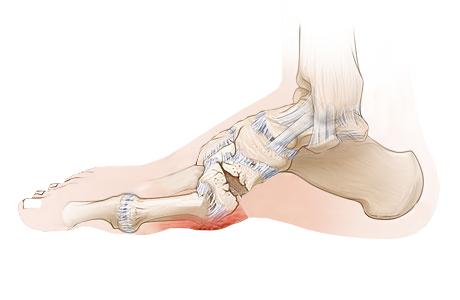Charcot Foot
What is Charcot Foot?
 Charcot foot attacks your bones, joints, and soft tissues in your feet. It is also known as Charcot arthropathy. Symptoms are not always noticed right away, however. So, you may not be aware that you have this disease. Eventually, you will notice painful sores and changes to the shape of your feet. Knowing what to look for will help with diagnosis. You can bring it to your doctor’s attention before too much damage occurs.
Charcot foot attacks your bones, joints, and soft tissues in your feet. It is also known as Charcot arthropathy. Symptoms are not always noticed right away, however. So, you may not be aware that you have this disease. Eventually, you will notice painful sores and changes to the shape of your feet. Knowing what to look for will help with diagnosis. You can bring it to your doctor’s attention before too much damage occurs.
Causes Charcot Foot
This condition develops in individuals that have nerve damage. They are unable to feel anything in their feet. This is common among those with diabetes. There are other factors that can also cause nerve damage, such as:
- Spinal cord injury or disease
- Infections
- HIV
- Syphilis
- Alcohol or drug abuse
Nerve damage is a common factor, but there are other causes. Some things can trigger charcot disease, such as:
- Foot surgery that heals slowly
- Sore on the foot that does not heal
- Untreated sprain or broken bone
Signs and Symptoms
Symptoms of charcot disease will include redness, warmth, and swelling in the affected foot. As a matter of fact, it is hard to confirm early on. X-rays and lab tests can be done. However, there are other foot problems with the same symptoms.
Not all doctors are familiar with charcot arthropathy. A podiatrist (foot specialist) is usually the best for a diagnosis. Doctors familiar with diabetes may also identify the disease. You need to visit a doctor if you notice any changes in your feet.
Treatment of the Disease
Treating charcot foot can take several months. Relaxing the injured foot is essential for success.
Stay off your foot: Your foot will usually be in a cast. Considering, it keeps it from moving. For a few months, the cast will be changed several times. As swelling decreases, the cast needs to be re-fit. Crutches, a wheelchair, or a cane will help you get around. Knee walkers can also be used. These let you place your knee on a set as you wheel around.
Prevent new problems: Once the cast comes off, you get prescription shoes, called orthotics. They will be the proper fit for your feet. These relieve pressure points that can cause sores. In some cases, you may also need a brace. Some of your daily routines may also need to be modified. You need to reduce wear and tear on the foot.
Repair bones: If the injuries make your foot unstable, surgery may be needed for Charcot disease. This is also an option if braces and shoes cannot be used. Bad sores can also lead to surgery. The surgeon will realign or fuse bones to improve stability. Sharp bones will also be smoothed to prevent cuts and sores.
Foot Care Moving Forward
Focusing on foot care will prevent Charcot arthropathy and treat it. Make sure you are taking care of your feet, such as:
- Get regular checkups with foot specialists
- Wash your feet every day
- Always wear shoes and socks
- Check your feet carefully every day. Look for swelling, redness, warmth, and sores.
For a preferred foot specialist in Broward or Palm Beach County call us today at 954-906-9272. Or for your convenience you now can schedule an appointment online. Conveniently located in Boca Raton, Deerfield Beach, Coral Springs & Plantation.
